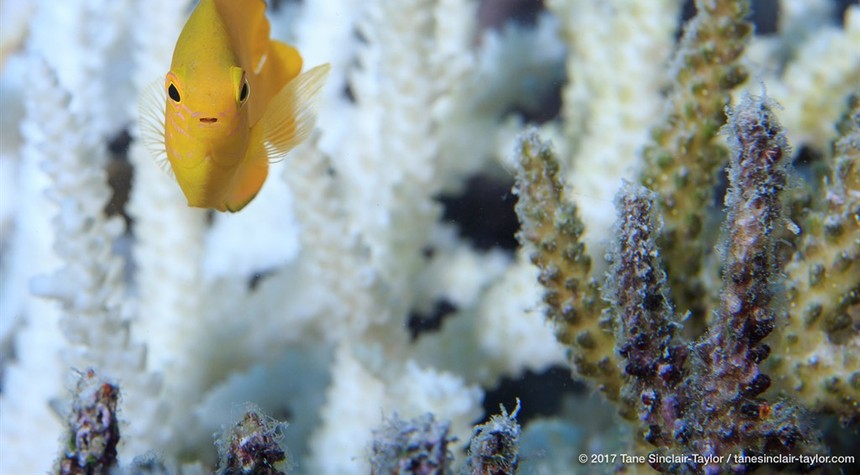By Alex Parker
July 29, 2021
-Red State
For those of you not wanting to be white supremacists, rejoice at a new method of moral improvement.
A University of California, Davis report offers your next rung on the ladder to racist-free rule.
People of privilege, I’m talking about the way you treat fish.
Specifically, you’re on the hook for the violence of your words.
According to a Fisheries Magazine-published report — Goodbye to “Rough Fish”: Paradigm Shift in the Conservation of Native Fishes — the racist patriarchy’s had a lot of gill gall:
Perspectives of white males have overwhelmingly dominated fisheries science and management in the USA.
The scorned and scaly can’t de-fin themselves. Though they don’t understand language, they’re being “othered” by English.
Fish have feelings, too, and we’re “rough(ing)” ’em up:
[White dominance] is exemplified by bias against “rough fish” — a pejorative ascribing low-to-zero value for countless native fishes.
The nautical name-calling is sad:
Sadly, fishers and resource management agencies continue to perpetuate [the term’s] use.
Behold the hate speech:
Related pejoratives include “trash fish,” “dirt fish,” “other fish,” “coarse fish”…
Also employed — that most vile of all invectives, the U-word:
“underused fish”
On top of being over-insulted, native fishes are under-conserved.
And that’s fishy: The native species “deliver critical ecosystem services,” and “many” are “long-lived and vulnerable to over-fishing.”
Hence, the authors “encourage agencies to revisit their policies regarding native fishes and provide suggestions for developing more holistic, protective, and inclusive conservation policy.”
Because, tragically, scientists aren’t celebrating diversity:
One product of [the] bias is that biologists have ironically worked against conservation of diverse fishes for over a century…
Your worst nightmare has come true — “these problems persist today.”
And racism-rife fish management has left some shades of skin out to sea:
[W]hile attitudes and regulations on (favored) species have shifted substantially over the past 100 years, policies for many native fishes have not. [Less fancied] species always sustained fisheries as food fish, but typically for underrepresented groups, such as Black and Indigenous Peoples of Color and immigrants. The term “rough fish” exemplifies this problem. It is a derogatory term that lumps together diverse fishes and life-history strategies perceived as having low-to-zero value.
Again, it’s those perniciously-pigmented oppressors:
White males have historically valued only a select group of species and have dominated management of freshwater fisheries in North America.
It’s marlin-sized marginalization:
Experiences of sovereign tribes in North America provide damning evidence on the efficacy of prevailing fish management paradigms. For example, the Ojibwe people in Wisconsin have lived with whites for 3 centuries and have been subject to their fish management regimes for about half that time. Litigation over treaty-stipulated hunting and fishing rights in the 1970s and 80s between mostly the state government and the six bands of Ojibwe resulted in joint management of species of most interest to both non-Indigenous sports fishers and native peoples. So-called “rough fish” have not been subject of negotiations because they are de-valued by many. However, they have always been esteemed in the Ojibwe communities.
Suckers:
Indeed, Namebini-giizis names the month of February the “Sucker Moon” because the noble suckerfish sacrificed their lives to feed the Ojibwe people. Yet during negotiations with the state, members of one of the Ojibwe communities were teased about their alleged preference for suckers.
The study was authored, in part, by Dr. Andrew L. Rypel.
Speaking to UC Davis, he waxed on the great white whales of wickedness:
“When you trace the history of the problem, you quickly realize it’s because the field was shaped by white men, excluding other points of view. Sometimes you have to look at that history honestly to figure out what to do.”
As for calling native fish “rough,” Andrew’s had it up to here:
“That has bothered me for a long time.”
Andrew ought to be elated — fish are getting bathed in an ocean of love as of late.
Sea for yourself:
Fish Fry: Social Justice Sizzles With the Woke Renaming of a Racism-Riddled Carp https://t.co/5jwOdYpN1t
— RedState (@RedState) July 19, 2021
Woke in the Water: Shark Advocates Call for an End to the Word 'Attacks' in Favor of 'Interactions'
https://t.co/Y1tD6FhEkx— RedState (@RedState) July 17, 2021
Back to the report, how do we rectify our racism?
UC Davis notes the study’s six suggestions toward a better world:
- Integrate Indigenous perspectives into fisheries management.
- Revisit species bag limits. Lower bag limits for native species until the science is conducted to confirm they could be higher. The study takes particular note of the fast-growing bowfishing market that has contributed to removing native species.
- Support science on native fishes. Game fish receive 11 times more research and management attention in American Fisheries Society journals than do “rough fish.” To learn the true value of native fishes, more research is required.
- Co-manage species that have co-evolved, such as freshwater mussels and fish that host them.
- Correct misinformation and enhance science education through outreach and education for all ages.
And, perhaps, most importantly:
- Stop saying “rough fish.” [The authors] suggest “native fish” as a simple alternative.
Congratulations to the researchers and their tenderness toward aquatic life.
Surely organisms with the sophistication of plankton will greatly appreciate not being labeled “underused.”
Perplexingly — as illustrated by the report — they’re fine with being called “suckers.”
Apropos of sucking, the chivalrous defense of our swimming sisters and brothers is all well and good.
But to be clear, not everyone in the ocean is awesome.
In fact — as we learned last June — some fish are an absolute pain in the butt:
Tail of the Sea: Man Complains of Stomach Pain, Doctors Find a Large Fish in His Rectum https://t.co/h0TbaEqnCi
— RedState (@RedState) June 9, 2020




